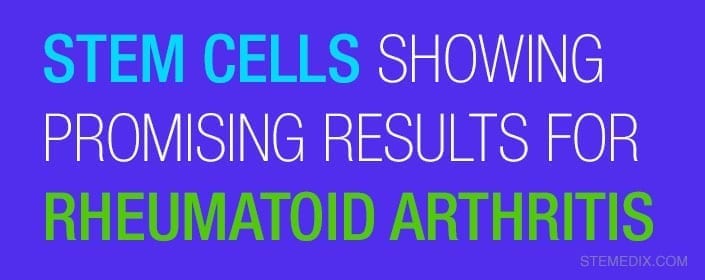
by admin | May 22, 2019 | Bone Marrow, Mesenchymal Stem Cells, Stem Cell Research, Stem Cell Therapy, Umbilical Stem Cell
Mesenchymal stem cells have two unique and powerful properties that make them the focus of intense scientific research. First, mesenchymal stem cells can escape recognition by the immune system. In other words, when mesenchymal stem cells are infused into the body, the immune system does not recognize them as foreign and does not react to them. If the immune system did respond to the stem cells, it would cause an aggressive and potentially deadly allergic or immunologic response. Second, mesenchymal stem cells have the power to inhibit the immune system. This means mesenchymal stem cells could be used to treat immunological and autoimmune diseases such as Rheumatoid Arthritis, Systemic Lupus Erythematosus, Multiple Sclerosis, and Crohn’s Disease, among others. In essence, mesenchymal stem cells can affect the immune system without triggering an inflammatory response making them an ideal treatment for these diseases.
For some time, mesenchymal stem cells extracted from bone marrow were thought to be the only type of mesenchymal stem cells capable of beneficially affecting the immune system. This fact is not necessarily bad, but it does mean that mesenchymal stem cell donors must undergo a bone marrow procedure, which can be painful and expensive. It would be far better if doctors could use mesenchymal stem cells taken from easier-to-get tissues such as fat (adipose), umbilical cord blood, or Wharton’s jelly (umbilical cord tissue). Most people have adequate amounts of fat just under the skin, and umbilical cord blood and tissue are thrown away as medical waste every day.
Fortunately for patients, Dr. Yoo and colleagues showed that mesenchymal stem cells taken from fat tissue, umbilical cord blood, and Wharton’s jelly exhibit the same immunomodulatory properties as mesenchymal stem cells taken from bone marrow. The researchers showed that these types of mesenchymal stem cells were able to suppress T-cell proliferation as effectively as those cells taken from bone marrow. T-cell proliferation, it should be pointed out, is a key step in autoimmune inflammation that occurs in diseases such as rheumatoid arthritis and others.
In short, mesenchymal stem cells taken from easier-to-get tissues were just as effective at suppressing inflammation (in vitro) as those taken from bone marrow. These results will need to be confirmed in clinical studies; however, this approach will be much more convenient and less expensive for patients and donors if they can use mesenchymal stem cells taken from fat or umbilical cord rather than bone marrow and yet reap the same benefits.
Reference: Yoo KH et al. (2009). Comparison of immunomodulatory properties of mesenchymal stem cells derived from adult human tissues. Cell Immunology. 2009;259(2):150-6.

by admin | Jul 24, 2018 | Health Awareness, Multiple Sclerosis, Parkinson's Disease, Rheumatoid Arthritis, Stem Cell Therapy
In a recent edition of JAMA, the results of a 30-year study examining the possible connection between stress and autoimmune disease were revealed. The findings don’t simply demonstrate a link; instead, they reveal that stress-related disorders are significantly associated with risks of developing the subsequent autoimmune disease. In the study of over 100,000 subjects, the correlation showed that individuals with a diagnosed stress-related disorder were 30-40% more likely to later be diagnosed with one of many possible autoimmune diseases.
What is a Stress-Related Disorder?
The type of stress study subjects encountered is not to be confused with the stressors we encounter during everyday life. Sitting in traffic or worrying about being late for a meeting, for example, are examples of acute stress. These forms of short-term stress generally come and go but fail to create the sort of long-term damage produced by chronic stress, or stress-related disorders.
Stress-related disorders are mental health conditions resulting from short- and long-term anxiety from mental, physical, or emotional stress. Examples of these include post-traumatic stress disorder (PTSD), obsessive-compulsive disorder, acute stress reaction, and adjustment disorder.
Which Types of Autoimmune Disorders Are Linked to Stress?
According to the study’s findings, individuals with stress-related disorders were more inclined to be diagnosed with one of 41 autoimmune disorders. Among the many autoimmune diseases observed by the research were psoriasis, Crohn’s disease, rheumatoid arthritis, and celiac disease.
Interestingly, additional variables seemed to further increase – or decrease – one’s risks of developing an autoimmune disease. Being diagnosed with PTSD at a young age, for instance, increased risks, while receiving antidepressant treatment shortly after being diagnosed with PTSD lowered rates of subsequent autoimmune disease diagnosis. Thus, it could be inferred that receiving treatment for a stress-related disorder may help to treat not only the stress itself but also minimize the lasting implications caused by it, including increased risks of disease.
What Causes the Connection?
Further research must still be conducted to pinpoint the precise long-term effects stress has on the body, and more specifically, on the immune system. Experts speculate that factors such as changes in cortisol levels and pro-inflammatory cytokine levels may need to be examined. Another hypothesis set forth by researchers is that individuals living with conditions such as PTSD might be more inclined towards unhealthy behaviors such as drinking more alcohol or sleeping less.
Although further research into this connection has yet to be conducted, one important takeaway from the findings is the fact that seeking treatment for stress-related disorders should now be considered more critical than ever. By consulting mental health professionals, individuals living with these conditions can pursue a tailored treatment approach to support short- and long-term improvements in overall wellness. For those with an auto-immune condition, see how stem cell therapy may help your symptoms and improve quality of life.

by admin | Mar 31, 2017 | Studies
A group of researchers in China who have recently observed positive effects of stem cells on patients with rheumatoid arthritis have now conducted an experiment that helps clarify exactly how these stem cells may contribute to improved symptoms in this particular patient population. The group uses umbilical cord stem cells, which are stem cells that have demonstrated immune regulatory functions because the immune system is implicated in rheumatoid arthritis.
Rheumatoid arthritis is characterized by inflammation and subsequent damage to the joints. The synovium is a type of connective tissue located in synovial joints like knees and elbows and is where the majority of the inflammation occurs. A specific protein, called cadherin-11 that is present in some of the cells in the lining of the synovium has been hypothesized to be an important culprit in rheumatoid arthritis because the protein can lead to inflammation and thus destruction of bones and cartilage.
The researchers decided to test whether umbilical cord stem cells may have an impact on cadherin-11, as such an impact could help explain how these cells help patients with rheumatoid arthritis. They therefore looked at fibrolast-like synoviocytes, the cells that express cadherin-11 in the lining of the synovium, in both patients with rheumatoid arthritis and patients with osteopathic arthritis. Because osteopathic arthritis does not involve the same kind of destruction to the synovium that rheumatoid arthritis does, the researchers expected to find less cadherin-11 in the fibroblast-like synoviocytes of the patients with osteopathic arthritis.
Not only did the researchers find, as suspected, that cadherin-11 levels were higher in the fibroblast-like synoviocytes of patients with rheumatoid arthritis, compared to those with osteopathic arthritis, but they also found that umbilical cord stem cells suppressed the cadherin-11 levels in the fibroblast-like synoviocytes from rheumatoid arthritis patients.
These results point to a potential mechanism by which umbilical cord stem cells reduce inflammation and improve symptoms in patients with rheumatoid arthritis. Additionally, they provide important information on how to develop treatments that will specifically target the cause of rheumatoid arthritis.
Stem cells are showing promising results for treating Rheumatoid Arthritis. Learn about it here.
Reference
Zhao et al. (2015). Umbilical cord-derived mesenchymal stem cells inhibit cadherin-11 expression by fibroblast-like synoviocytes in rheumatoid arthritis. Journal of Immunology Research, 2015, 1-10.

by admin | Mar 20, 2017 | Studies
Specifically, the umbilical cord mesenchymal stem cells were able to inhibit the proliferation of fibrolast-like synoviocytes cells from rheumatoid arthritis patients. These fibroblast-like synoviocytes are critical components of rheumatoid arthritis. In addition, the umbilical cord mesenchymal stem cells reduced levels of cells that promote inflammation and increase the levels of those that fight inflammation.
Rheumatoid arthritis is an autoimmune disease, meaning that the immune system of those who suffer from rheumatoid arthritis starts to attack the patient’s own body because it mistakenly perceives the body’s own cells as harmful foreign agents. The disease specifically involves the T-cells of the immune system and mainly attacks synovial joints like the knees and elbows.
Stem cells have been proposed to help with the treatment of a number of diseases, including rheumatoid arthritis. Because the current approaches for treating rheumatoid arthritis are expensive and none of them lead to long-term remission, new treatment options are actively sought. There has been evidence to suggest that bone marrow mesenchymal stem cells can help with rheumatoid arthritis, but recently, researchers theorized that umbilical cord mesenchymal stem cells may have its own advantages for the use in treating the disease.
The idea for using umbilical cord mesenchymal stem cells arose because of the ability of these cells to suppress the immune system. Specifically, these cells have been shown to affect the number of active T-cells, making them an appropriate candidate for opposing the physiological basis of rheumatoid arthritis.
The current study made strides in the technical use of umbilical cord mesenchymal stem cells for treating rheumatoid arthritis and also provided evidence that these cells are particularly well-suited for this particular purpose. Specifically, the umbilical cord mesenchymal stem cells were able to inhibit the proliferation of fibrolast-like synoviocytes cells from rheumatoid arthritis patients. These fibroblast-like synoviocytes are critical components of rheumatoid arthritis. In addition, the umbilical cord mesenchymal stem cells reduced levels of cells that promote inflammation and increase the levels of those that fight inflammation. Finally, these cells also reduced the severity of the disease in a model of arthritis.
These promising results highlight the potential of umbilical cord mesenchymal stem cells in medicine – and particularly their potential to aid in the development of treatment options for rheumatoid arthritis. Further research will likely help clarify exactly how these cells can be used in the disease and to what extent they can help rheumatoid arthritis patients.
To find out more about the new research clarifying how stem cells help Rheumatoid Arthritis patients, click here.
Reference
Liu et al.. (2010). Therapeutic potential of human umbilical cord mesenchymal stem cells in the treatment of rheumatoid arthritis. Arthritis Research and Therapy, 12(6), R210.





 St. Petersburg, Florida
St. Petersburg, Florida
